RPL
سعر Rocket Pool
4.0890$
+0.025000$
(+0.61%)
تغير السعر لمدة 24 ساعة الأخيرة

ما شعوركَ حيال RPL اليوم؟
شارك مشاعرك هنا بالضغط على الإبهام المرفوع إذا كنت تتوقّع نظرة صعودية للعملة الرقمية أو بالضغط على الإبهام المعكوس إذا كنت تتوقّع نظرة تنازلية لها.
صوِّت لعرض النتائج
معلومات سوق Rocket Pool
القيمة السوقية
تُحسَب القيمة السوقية بضرب العرض المتداول للعملة الرقمية في سعرها الحالي.
القيمة السوقية = العرض المُتداوَل × السعر الحالي
القيمة السوقية = العرض المُتداوَل × السعر الحالي
العرض المتداول
إجمالي مبلغ العملة الرقمية المتاح للجمهور في السوق.
ترتيب القيمة السوقية
ترتيب العملة الرقمية من حيث القيمة السوقية.
أعلى سعر على الإطلاق
أعلى سعر وصلت إليه العملة الرقمية في سجل تداولها.
أدنى سعر على الإطلاق
أقل سعر وصلت إليه العملة الرقمية في سجِل تداولِها.
القيمة السوقية
M87.35$
العرض المتداول
21,304,786 RPL
100.00% من
21,304,786 RPL
ترتيب القيمة السوقية
190
عمليات المراجعة

المراجعة الأخيرة: 7 يونيو 2021
أعلى سعر خلال 24 ساعة
4.1360$
أدنى سعر خلال 24 ساعة
3.8910$
أعلى سعر على الإطلاق
66.0000$
-93.81% (-61.9110$)
آخر تحديث: 17 أبريل 2023
أدنى سعر على الإطلاق
3.1500$
+29.80% (+0.93900$)
آخر تحديث: 7 أبريل 2025
موجز Rocket Pool
المحتوى التالي مصدره .

Rocket Pool
تم دمج Nimbus v25.4.1 في Smart Node v1.15.6 جنبا إلى جنب مع تحديثات Lighthouse و Geth ، لذلك يوصى بهذا الإصدار الأخير إذا كنت تقوم بتشغيل أي من هؤلاء العملاء الثلاثة.
تأكد من أن العقدة الخاصة بك إما على الإصدار 1.15.5 أو الإصدار 1.15.6 لدعم شوكة Pectra الأسبوع المقبل!
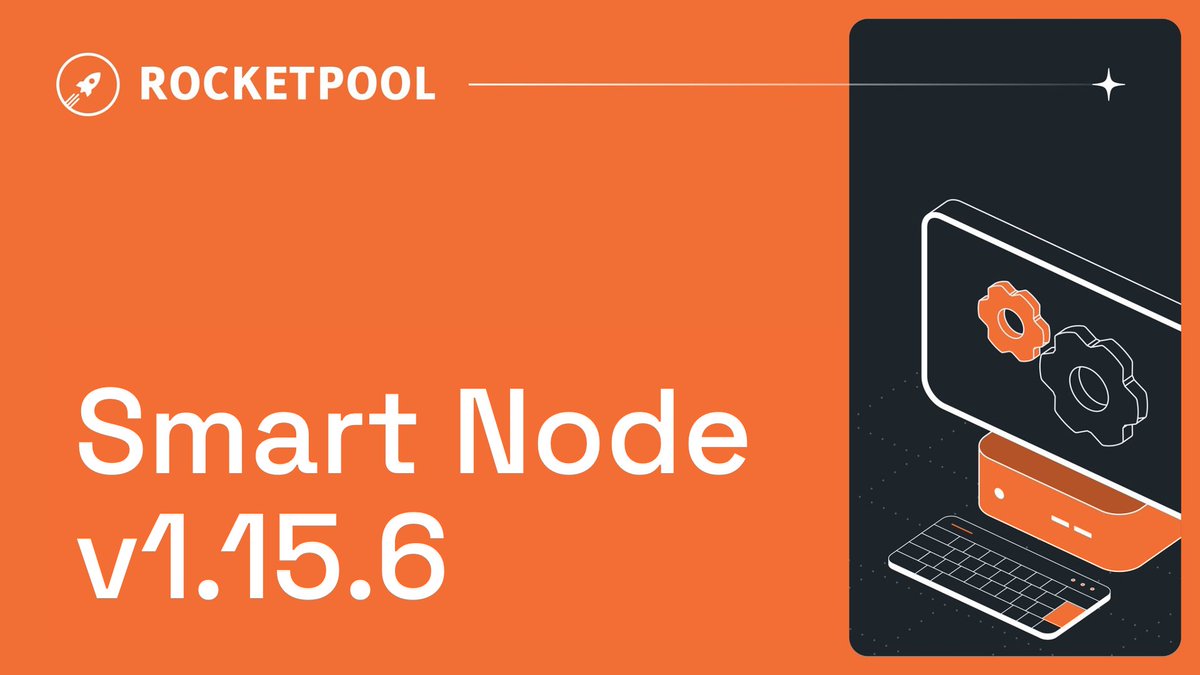

Rocket Pool
👇 إذا كانت العقدة الخاصة بك تعمل ب Nimbus، فمن المستحسن إجراء تحديث يدوي إلى الإصدار 25.4.1 لتجنب فقدان مقترحات الكتلة. تحقق من الإعلان في Rocket Pool Discord لمزيد من التفاصيل.
7.14 ألف
25
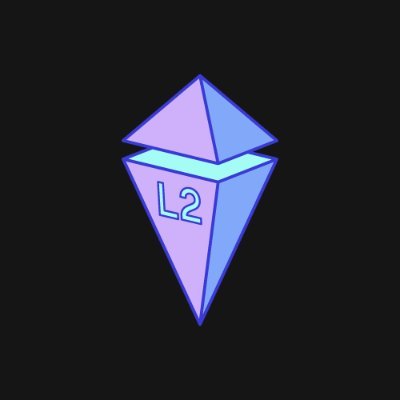
Ethereum Daily
أفضل المشاريع الرائدة في نمو 📊 7D
👇
▫️ @TurboToadToken - 125.8٪ - $TURBO
▫️ @virtuals_io - 113.5٪ - $VIRTUAL
▫️ @bonk_inu - 65.3٪ - $BONK
▫️ @aioznetwork - 48.4٪ - $AIOZ
▫️ @worldcoin - 48.3٪ - $WLD
▫️ @realflokiinu - 34.1٪ - $FLOKI
▫️ @Immutable - 24.1٪ - $IMX
▫️ @0xPolygon - 23.5٪ - $MATIC
▫️ @axelar - 22.5٪ - $AXL
الزخم لا يكذب 👀
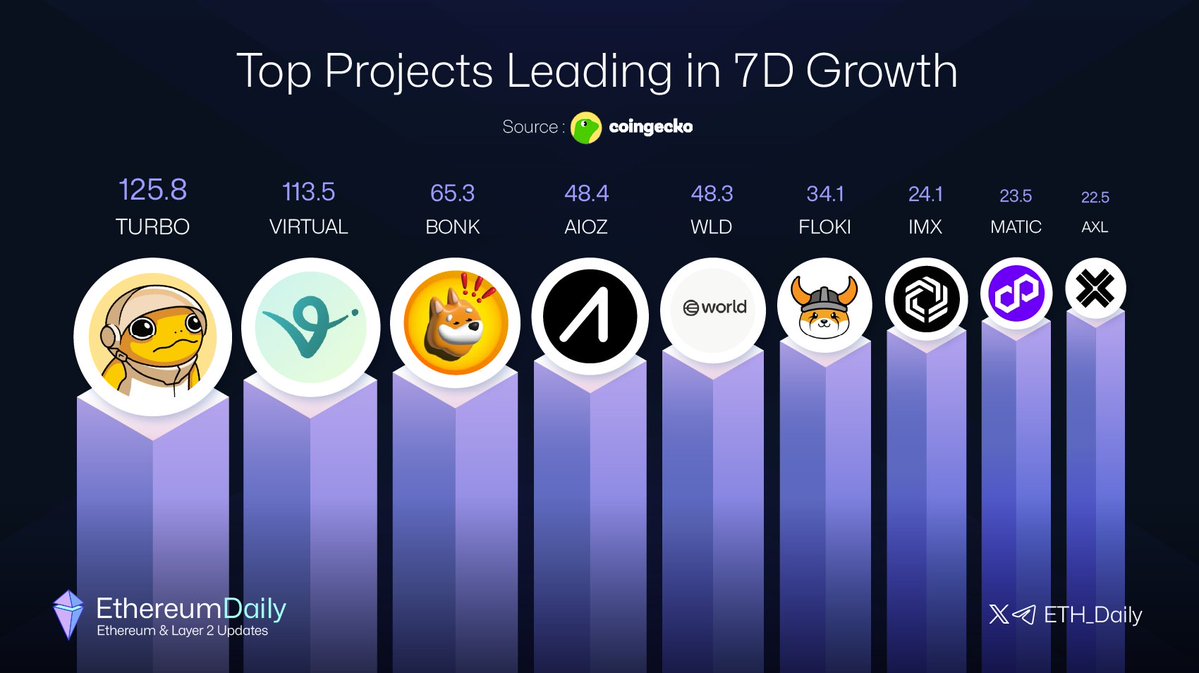

Ethereum Daily
TKVResearch تحسيمه 🔥 - كيف ستعمل ترقية Ethereum's Pectra على زيادة الروايات 👇 الرئيسية
▫️ LSDs (@LidoFinance ، @Rocket_Pool ...)
🔹 EIP-4788: تفتح بيانات المدقق إعادة التخزين السلسة
🔹 EIP-7251: أرصدة أعلى = كفاءة رأس مال أفضل
▫️ L2s (@arbitrum ، @optimism ، @zksync ...)
🔹 EIP-6780: SELFDESTRUCT القرص يخفض رسوم L1
🔹 EIP-5920: PAY opcode يجعل تحويلات ETH أرخص
▫️ Oracles (@chainlink...)
🔹 EIP-4788: بيانات الإجماع المباشر → نقاط جديدة يمكن التحقق منها
🔹 EIP-5920: انخفاض تكاليف عمليات الإرسال على السلسلة
▫️ التمويل اللامركزي (@aave ، @compoundfinance ، @Uniswap ، @CurveFinance ...)
🔹 EIP-5920: توفير الغاز في المقايضات → يعزز كفاءة رأس المال
صيحة كبيرة @UnifaiNetwork لتشغيل أبحاث 🔥 Pectra
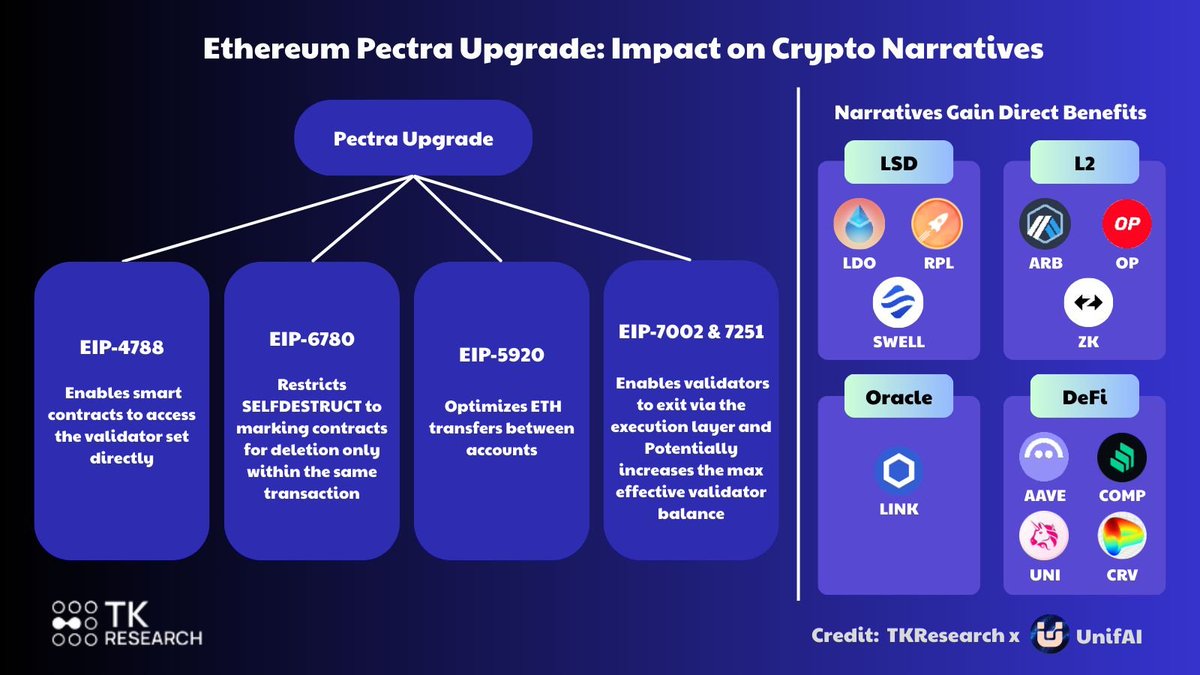
123.42 ألف
157
حاسبة RPL


أداء Rocket Pool السعري بعملة USD
السعر الحالي لعملة Rocket Pool هو 4.0890$. وخلال آخر 24 ساعة، فإن عملة Rocket Pool أصبحت زاد بمقدار +0.62%. ولديها حاليًا عرض مُتداوَل يبلغ 21,304,786 RPL وحد أقصى للعرض يبلغ 21,304,786 RPL، مما يمنحها قيمة سوقية للعرض الإجمالي تبلغ M87.35$. وحاليًا تحتل عملة Rocket Pool الرقمية المركز 190 في ترتيب القيمة السوقية. يُحدَّث سعر Rocket Pool/USD لحظيًّا.
اليوم
+0.025000$
+0.61%
7 أيام
-0.41600$
-9.24%
30 يومًا
+0.51700$
+14.47%
3 أشهر
-1.6110$
-28.27%
تحويلات عملة Rocket Pool الرائجة
آخر تحديث: 08/05/2025، 09:49
نبذة عن Rocket Pool (RPL)
التقييم المُقدَّم تقييمٌ مُجمَّعٌ تجمعه OKX من المصادر المتوفرة، وهو لغرضٍ إعلاميٍّ فقط. لا تضمن OKX جودة التقييم أو دقته، وليس الهدف منه تقديم: (1) مشورة أو توصية استثمارية؛ أو (2) عرض أو التماس لشراء الأصول الرقمية أو بيعها أو تخزينها؛ أو (3) مشورة مالية أو محاسبية أو قانونية أو ضريبية، فالأصول الرقمية، بما فيها العملات المستقرة والرموز المميزة غير القابلة للاستبدال/NFT، تنطوي على درجةٍ كبيرةٍ من المخاطر، وقد تتقلب إلى حدٍ كبير، كما أنّها قد تُصبح بلا قيمة. كما أنّ سعر الأصول الرقمية وأداءها غير مضمونين وقد يتغيران دون إنذار، والتأمين ضد الخسائر المحتملة لا يُغطّي أصولك الرقمية. العائدات التاريخية ليست مؤشراً على العائدات المستقبلية، ولا تضمن OKX أي عائدٍ أو سداد رأس المال أو الفائدة، ولا تُقدّم أيضًا أي توصيات بالاستثمار أو الأصول. لذا عليك التأنّي في دراسة ما إذا كان تداول الأصول الرقمية أو تخزينها ملائمًا لك بناءً على وضعك المالي، ومن فضلك استشر الأخصائي القانوني/الضريبي/الاستثماري خاصتك إذا كانت لديك أية أسئلة عن ظروفك الخاصة.
عرض المزيد
- الموقع الرسمي
- Github
- مستكشف الكتلة
نبذة عن المواقع الإلكترونية التابعة لجهة خارجية
نبذة عن المواقع الإلكترونية التابعة لجهة خارجية
باستخدامك للموقع الإلكتروني الخاص بالجهة الخارجية ("TPW")، فإنك تقبل أن أي استخدام له يخضع لشروط موقع الجهة الخارجية ويُتحكَّم به وفقًا لتلك الشروط. وما لم يُنص صراحةً على ذلك كتابيًا، فإن منصة OKX وشركائها المُسوِّقين ("OKX") ليسوا مرتبطين بأي حال من الأحوال بمالك أو مُشغِّل موقع الطرف الثالث. كما أنك توافق على أن منصة OKX غير مسؤولة في حالة حدوث أي خسارة أو ضرر أو أي تبعات أخرى ناتجة عن استخدامك لموقع الجهة الخارجية (TPW). يُرجى العلم بأن استخدام موقع الجهة الخارجية قد يؤدي إلى خسارة أصولك أو انخفاض قيمتها.
الأسئلة الشائعة عن Rocket Pool
كم تبلغ قيمة واحدة من عملة Rocket Pool اليوم؟
حاليًا، سعر الواحدة من عملة Rocket Pool يُعادل 4.0890$. أنت في المكان المناسب للحصول على إجابات ورؤى ثاقبة حول حركة سعر عملة Rocket Pool. استكشِف أحدث الرسوم البيانية لعملة Rocket Pool وتداوَل بمسؤولية عبر منصة OKX.
ما المقصود بالعملة الرقمية؟
العملات الرقمية، مثل عملة Rocket Pool، هي أصول رقمية تعمل على سجل حسابات عمومي يُعرف بالبلوكشين. اعرف المزيد عن العملات الرقمية والعملات الرمزية المقدمة على منصة OKX وخصائصها المختلفة، بما في ذلك الأسعار الحية والرسوم البيانية في الوقت الفعلي.
متى اختُرِّعت العملة الرقمية؟
بسبب الأزمة المالية في عام 2008، تعاظم الاهتمام بالتمويل اللامركزي. وقدمت عملة Bitcoin حلاً مستحدثًا بكونها أصلاً رقميًا على شبكة لامركزية. ومنذ ذاك الحين، تمّ إنشاء الكثير من العملات الرمزية الأخرى أيضًا، مثل عملة Rocket Pool.
هل سيرتفع سعر عملة Rocket Pool اليوم؟
اطلع على صفحتنا صفحة توقُّعات أسعار عملة Rocket Pool للتوقُّع بالأسعار المستقبلية وتحديد أهدافك السعرية.
إخلاء المسؤولية
المحتوى الاجتماعي على هذه الصفحة ("المحتوى")، بما في ذلك، على سبيل المثال لا الحصر، التغريدات والإحصائيات التي تقدمها LunarCrush، مصدرها أطراف ثالثة ويتم توفيرها "كما هي" لأغراض إعلامية فقط. لا تضمن OKX جودة المحتوى أو دقته، ولا يمثل المحتوى آراء OKX. لا يُقصد من ذلك تقديم (1) نصيحة استثمارية أو توصية، (2) عرض أو طلب لشراء أو بيع أو الاحتفاظ بالأصول الرقمية، أو (3) مشورة مالية أو محاسبية أو قانونية أو ضريبية. تنطوي الأصول الرقمية، بما في ذلك العملات المستقرة ورموز NFT، على درجة عالية من المخاطرة، وقد تشهد تقلبات شديدة. لا يوجد ضمان لسعر الأصول الرقمية وأدائها وقد يتغير دون إشعار مسبق.
لا تقدم OKX أي توصيات بشأن الاستثمار أو الأصول. يجب عليك التفكير بعناية كون تداول الأصول الرقمية أو امتلاكها مناسبًا لك حسب وضعك المالي أم لا. يُرجى استشارة خبير شؤون قانونية أو ضرائب أو استثمار بخصوص أي أسئلة متعلقة بظروفك الخاصة. لمزيد من التفاصيل، يُرجى الرجوع إلى شروط الاستخدام وتحذير المخاطر. من خلال استخدام الموقع الإلكتروني التابع لطرف ثالث ("TPW")، أنت تقرّ بأن أي استخدام لهذا الموقع سيكون خاضعًا لشروط وأحكام الموقع ذاته وتابعًا له. ما لم يُذكر بشكل صريح ومكتوب، فإن منصة OKX والشركات التابعة لها ("OKX") غير مرتبطة بأي شكل من الأشكال بمالك أو مشغّل الموقع التابع لطرف ثالث. أنت توافق على أن OKX غير مسؤولة عن أي خسارة أو ضرر أو أي تبِعات أخرى تنشأ عن استخدامك للموقع التابع لطرف ثالث. يُرجى العلم أن استخدام موقع تابع لطرف ثالث قد يؤدي إلى خسارة أصولك أو نقصانها. قد لا تتوفر الخدمة في جميع الولايات القضائية.
لا تقدم OKX أي توصيات بشأن الاستثمار أو الأصول. يجب عليك التفكير بعناية كون تداول الأصول الرقمية أو امتلاكها مناسبًا لك حسب وضعك المالي أم لا. يُرجى استشارة خبير شؤون قانونية أو ضرائب أو استثمار بخصوص أي أسئلة متعلقة بظروفك الخاصة. لمزيد من التفاصيل، يُرجى الرجوع إلى شروط الاستخدام وتحذير المخاطر. من خلال استخدام الموقع الإلكتروني التابع لطرف ثالث ("TPW")، أنت تقرّ بأن أي استخدام لهذا الموقع سيكون خاضعًا لشروط وأحكام الموقع ذاته وتابعًا له. ما لم يُذكر بشكل صريح ومكتوب، فإن منصة OKX والشركات التابعة لها ("OKX") غير مرتبطة بأي شكل من الأشكال بمالك أو مشغّل الموقع التابع لطرف ثالث. أنت توافق على أن OKX غير مسؤولة عن أي خسارة أو ضرر أو أي تبِعات أخرى تنشأ عن استخدامك للموقع التابع لطرف ثالث. يُرجى العلم أن استخدام موقع تابع لطرف ثالث قد يؤدي إلى خسارة أصولك أو نقصانها. قد لا تتوفر الخدمة في جميع الولايات القضائية.
حاسبة RPL



